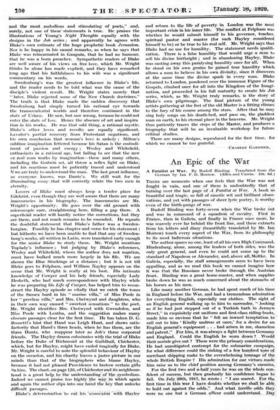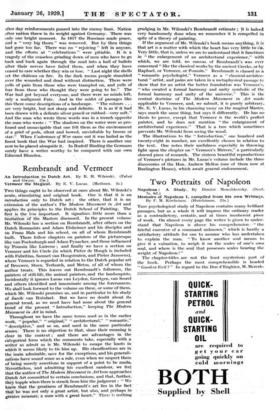An Epic of the War
THERE are moments when one feels that the War was not fought in vain, and one of them is undoubtedly that of turning over the list Page: of 'A Fatalist at War,' 'A hook so beautiful and tragic, so full of caustic wit and brilliant. obser- Vations, and yet with passages of sheerlyric poetry, is worthy
even of the birth-pangs Of war. . ..
Rudolf Bindink was forty-seven when the War broke Out and -was in command of a squadron of cavalry. First in France, then in Galicia, and finally in FMnee once more lie was scarcely ever far behind the front line, and these extracts from his letters and diary (beautifully translated by Mr. Ian Morrow) touch every aspect of the War, from its philOscphy- . to its most ludicrous situations. - The author spares no one, least of all his own High COMMand. Hindenburg, alone, among the leaders of both aides, was the only great general, and even 4e could not come -up to the standard of Napoleon or. Alexander, and, abOve all, Moltke. In Galicia, especially, the staff arrangements seem to have been appalling, and as we read this book we cannot imagine how it was that ,the Russians never broke through. the Austrian front. Binding was a great. horse-master, and when supplies broke down he was as much concerned about the stomachs of
his horses as his men. _
Like many another German, he had spent much of his time in England before the War, and had a tremendous admiration for everything English, especially our clothes. The sight of an English general walking up to him to surrender, ", looking as if he had just stepped out of a Turkish bath in Jermyn Street," in exquisitely cut uniform and first-class riding-boots, made him so envious that he " felt an inward temptation. to call out to him.' Kindly undress at once,' for a desire for an English general's equipment . . . had arisen in me, shameless. and patent." For. him, it was always a fight between Germany and England. Could the . English be worn down ? Would their. morale give out ? These were the primary considerations, He had . unmitigated contempt for the submarine campaign, for what difference could the sinking of a few hundred tons of merchant shipping make to the overwhelming tonnage of the whole British Empire ? His admiration, for our virtues,..made him raise us to the chief position among Germany's enemies, .
For the first two and a-half years he was on the whole con7 fldent of success, but then gradually his confidence began to fail. On July 29th, 1917, he. wrote " I am scared. For the first time in this war have doubts whether we shall be able_ to hold out against the odds." And what terrific odds they were no one but a German officer could understand. Day after day reinforcements poured into the enemy lin& -Nation after nation threw in its weight against Germany. There was only one bright moment. In 1917 the Russians made peace, and -a " very big thorn" was removed. But by then things had gone too far. There was no " rejoicing " left-in anyone, and the efforts at " celebrations " were pitiable. • It is a tragedy of the ceaseless grinding down of men who have to go back and back again through the mud into a hail of bullets after their nerves have failed them, and when they have
ceased to care whether they win or lose. " Last night the shells set the chateau on fire. In the dark moms people stumbled over the wounded and dead without distinction. There were yells of pain from those who were trampled on, and yells of fear from those who thought they were going to be." The War- had got beyond everyone, and there were no minds left, only a malignant Fate. And in the midst of passages like this there come descriptions of a landscape. " The colours . . . are very bright, but not sharp and definite. It is as if it had been drawn with a delicate silver pencil or rubbed—very soft." And the man who wrote these words was in a trench opposite the man who wrote : " The shadows on the water were so pro- found and unnavigable that one felt them as the environment of a grief of gods, silent and bowed, unvisitable by breeze or star." When Undertones of War came out it was hailed as the finest book that the War had inspired. There is another one now-to-be-placed alongside it In Rudolf Binding the Germans surely have a writer worthy to be compared with our own Edmund Blunden.









































 Previous page
Previous page